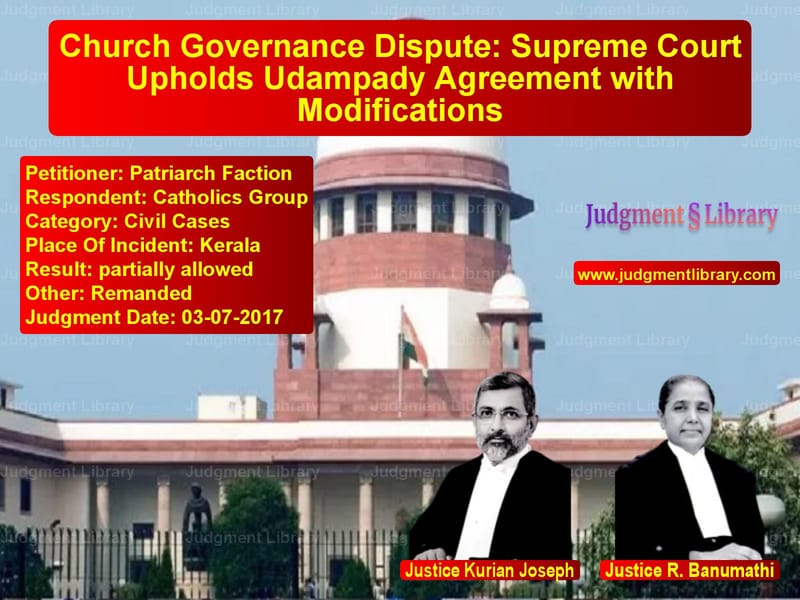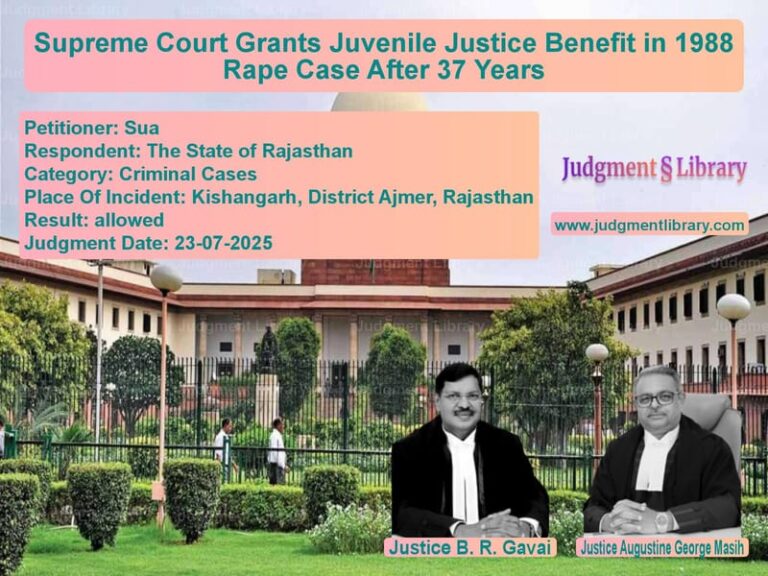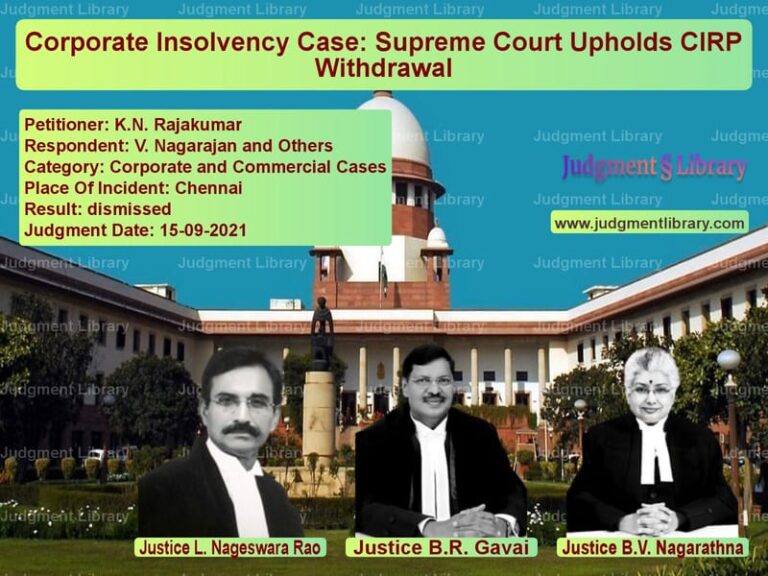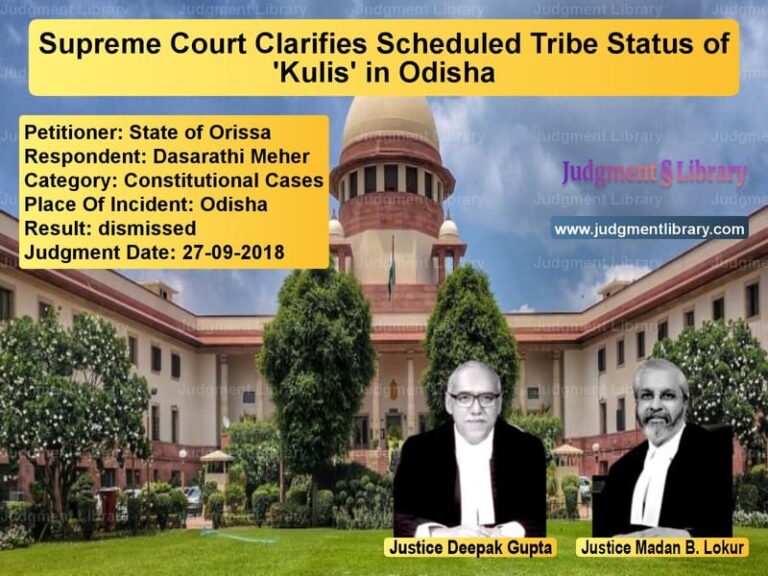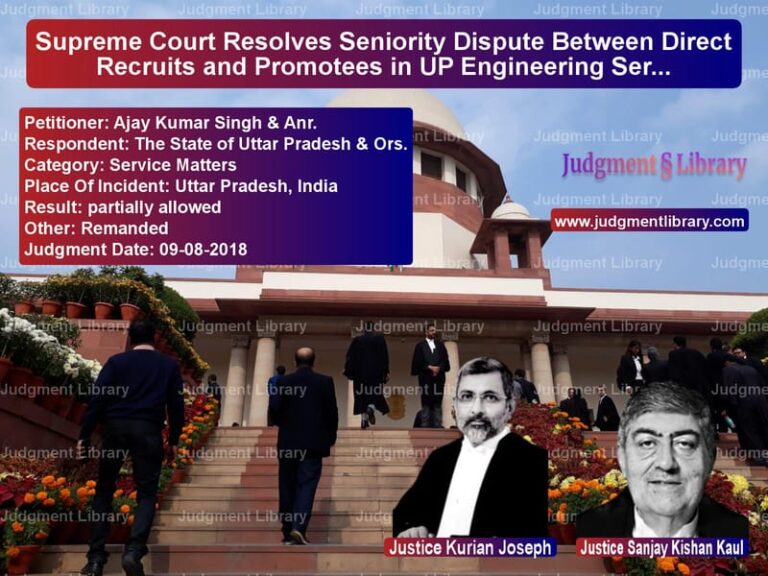Church Governance Dispute: Supreme Court Upholds Udampady Agreement with Modifications
The legal battle over the governance of Kolencherry Church and Varikoli Church has been a long-standing issue involving multiple appeals and conflicting claims over church administration. This case, which reached the Supreme Court, primarily revolved around whether the administration of these churches should be governed by the Udampady agreement or if a new scheme should be framed to ensure inclusive and democratic governance.
Background of the Case
The dispute arose between two factions—the Patriarch faction and the Catholics group—who had differing interpretations of church governance. The Patriarch faction, adhering to the Udampady agreement executed on December 30, 2013, sought legal validation that church administration should continue under this agreement. On the other hand, the Catholics group argued that the agreement was outdated and not reflective of the current realities and needs of the church congregation.
Suit No. 43 of 2006 was filed by the Patriarch faction in an attempt to secure an official declaration from the courts that the church and its assets must be governed under the Udampady agreement. They also sought the appointment of a receiver to oversee the administration and the organization of elections to ensure a transparent process.
Similarly, in another case, O.S. No. 10 of 2003 was filed by the Catholics group in relation to the administration of Varikoli Church. They demanded judicial intervention to safeguard their rights in the management of church affairs and properties. The matter escalated as both parties sought legal backing for their respective claims.
Arguments of the Petitioner
The petitioners contended that:
- The church administration should strictly adhere to the Udampady agreement, which had long been the foundation of governance.
- The agreement provides a well-established framework that ensures stability in church affairs.
- Deviating from the agreement would create mismanagement and chaos.
- For decades, the church had been governed by this agreement without disputes, proving its effectiveness.
Arguments of the Respondent
The respondents countered these arguments by stating:
- The Udampady agreement was no longer suitable given the evolving needs of the congregation.
- The agreement was drafted at a time when circumstances were different, and it does not cater to modern governance demands.
- A new scheme should be formulated to ensure fair and democratic church administration.
- Continuing with an outdated system would marginalize certain sections of the congregation and lead to conflicts.
Supreme Court’s Analysis and Judgment
The Supreme Court, after thorough analysis, considered the historical significance of the Udampady agreement while also acknowledging the concerns raised about inclusivity. The Court found that:
- The Udampady agreement had been the guiding document for church governance for many years and had provided a stable administration framework.
- However, the concerns regarding democratic representation and inclusivity were valid and needed to be addressed.
- The church governance structure should not be rigid and must evolve to accommodate contemporary challenges.
The Court stated: “While historical agreements form the foundation of governance, they cannot be absolute. It is necessary that governance frameworks evolve to accommodate the aspirations of the congregation while respecting the essence of the agreement.”
Modifications Ordered by the Court
While upholding the Udampady agreement as the primary document for church governance, the Supreme Court ordered the following modifications:
- A special committee must be formed to oversee the governance structure and ensure representation from all sections of the church congregation.
- The committee shall conduct periodic elections to allow for democratic decision-making within the church administration.
- A review mechanism must be put in place to assess the governance model every five years.
- The concerns of the respondents regarding inclusivity should be addressed through amendments that do not violate the spirit of the Udampady agreement.
Implications of the Judgment
This ruling sets a significant precedent in cases involving religious institutions and governance disputes. The Court balanced the need to uphold historical agreements with the necessity of evolving governance models. The ruling emphasized:
- The importance of honoring traditional agreements while also adapting them to modern times.
- The need for democratic representation in religious institutions.
- That governance disputes should be settled in a way that safeguards the interests of all members rather than benefiting only one faction.
Conclusion
The Supreme Court’s decision in this case reaffirms the judiciary’s role in ensuring fairness in religious and institutional governance. While recognizing the historical significance of the Udampady agreement, the Court also mandated modifications to ensure inclusivity and transparency. This judgment serves as a model for resolving similar governance disputes in religious institutions across the country.
By striking a balance between tradition and modernity, the Supreme Court has ensured that church administration remains both legally sound and reflective of the congregation’s needs. The decision upholds the principles of fairness, democracy, and historical continuity, setting a vital precedent for future cases involving church governance disputes.
Don’t miss out on the full details! Download the complete judgment in PDF format below and gain valuable insights instantly!
Download Judgment: Patriarch Faction vs Catholics Group Supreme Court of India Judgment Dated 03-07-2017.pdf
Direct Downlaod Judgment: Direct downlaod this Judgment
See all petitions in Property Disputes
See all petitions in Landlord-Tenant Disputes
See all petitions in Specific Performance
See all petitions in Judgment by Kurian Joseph
See all petitions in Judgment by R. Banumathi
See all petitions in partially allowed
See all petitions in Remanded
See all petitions in supreme court of India judgments July 2017
See all petitions in 2017 judgments
See all posts in Civil Cases Category
See all allowed petitions in Civil Cases Category
See all Dismissed petitions in Civil Cases Category
See all partially allowed petitions in Civil Cases Category

